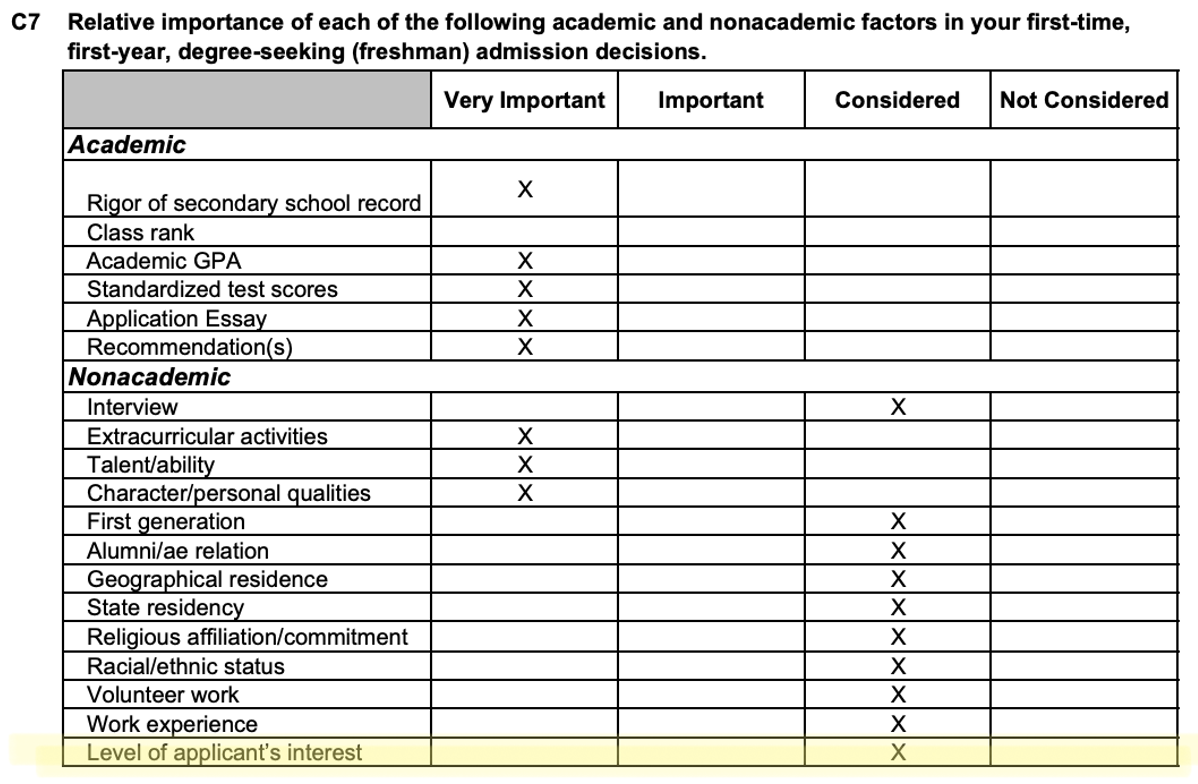Duke is one of the most popular schools with our clients. It has a great culture, robust academics, and it seems like everyone wants to go there. Their most recent acceptance rate? 7.7%. That makes Duke more popular with applicants than schools like Dartmouth, Cornell, and UPenn. So how can you set yourself up with the best chances possible when applying to Duke? Demonstrated interest. Which sounds simple enough, but here’s where it gets confusing. Duke says that they don’t track demonstrated interest:
“’Demonstrated interest’ as most people use the term is not a plus factor in our process. Students don’t need to visit the campus, and we discourage students from contacting the Admissions Office in order to demonstrate their interest in us. There is no benefit to emailing or meeting your regional admissions officer.”
Why does it feel like they’re leading up to telling us that they actually do track demonstrated interest, but instead they use some silly other name for it? Simply because they do not want to answer emails?
“If you want a term to use what we look for, you could say that applicants should be able to communicate their ‘demonstrated knowledge’ through their application rather than their ‘demonstrated interest’ through the number of times they have visited, met, or contacted us.”
Oh, because that’s exactly what they were doing. Let’s check out their Common Data Set for 2020-2021 just to clarify.
Well, that settles it! We do not care what Duke says, they track demonstrated interest. So let’s dive into what you can do to prove to Duke that you’re all in on becoming a Blue Devil.
On top of making sure you have the best application possible, with great grades, a niche you’ve explored in your extracurriculars, and a+ test scores, you need to take steps to prove that you’ve done your research on Duke and that you’re certain it’s a good fit.
What is demonstrated interest?
Colleges care about their yield rate, like a lot. Their yield rate is the percentage of applicants who get in that actually enroll at the school. With schools seeing huge increases in application numbers, (especially due to continuations of COVID-19 test optional policies) they want to make sure they’re admitting students who will actually attend their college. One of the ways you can prove that is by demonstrating interest (errr… or demonstrating “knowledge”) through a variety of means.
Basically, demonstrated interest is the tally of all the things you could have done to show a college that you’re interested, even before ever submitting an application. The biggest thing you can do to prove that you really, really, want to go to Duke is by applying early. Early Decision is a binding admissions decision that tells colleges that you’ll withdraw all other applications if you get in, so yeah, pretty serious level of interest there.
So what else can you do? Good news, Duke literally lists it out for you in their FAQ section. Even better news, it’s the same thing we’d generally advise. They want you to get on the college’s mailing list, attend virtual sessions, take a virtual tour, try and get an admissions interview, and also kind of weirdly, “click on links” of emails they send you. They also suggest things like “explore the website” and “make a separate email address just for admissions,” which is cool but like, not trackable.
We like demonstrated interest because it not only helps you look better on your application, but it also allows you to learn as much as humanly possible about the school before you apply. This is probably why Duke calls it “demonstrated knowledge,” but it’s still super corny and we don’t like it. But while you do your research, you could learn that maybe you won’t like it there. Or you find a really cool niche program that you like even more! This is just another tool that serves you in a few great ways.
However, demonstrated interest does have some downsides. We don’t love that schools track this, because frankly many students don’t have the means or ability to travel cross country to tour a campus, or maybe don’t have access to computers outside of school hours for info sessions or emailing admissions officers, or don’t go to a school that hosts the top colleges at college fairs. But Duke actually knows this, and says this is exactly why they don’t count things like in person visits or emails. So, kudos Duke.
So what do I do now?
Since Duke tracks “demonstrated knowledge,” (ugh) it’s time to start doing the things they want to see! Attend those virtual sessions and tours! Sign up for emails! Explore the college website! Even though they say that they don’t track emails to the admission officers, don’t be scared to send them emails to ask questions! Use this time to be curious and learn as much as you can about Duke.
If you are having a rough time with your college list, or don’t even know where to start when it comes to the application process, we have a team of counselors who are experts in this field.
Reach out to us today if you want to get started.
